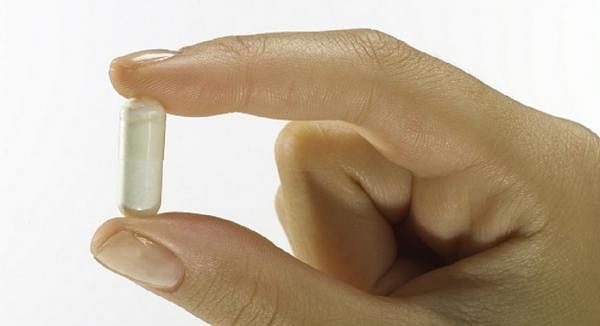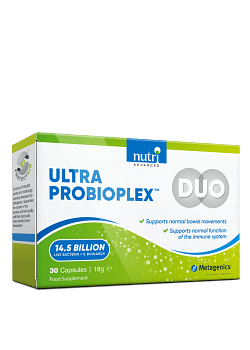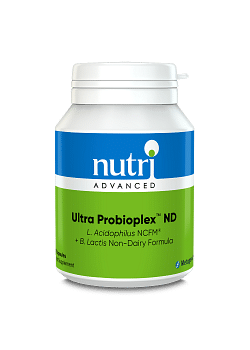Why Are Friendly Bacteria So Important?
Why you can trust Nutri Advanced Every article on our site is researched thoroughly by our team of highly qualified nutritionists. Find out more about our editorial process.
Why Are Friendly Bacteria So Important?
The 100 trillion or so bacteria that live in your gut, commonly referred to as the ‘gut microbiome’, are now considered almost to be an organ in their own right and perhaps as important to your health and happiness as your genes. Needless to say, you need to look after them!
Research into the gut microbiome has exploded in the last couple of decades. Once considered just to be involved in the workings of the gastrointestinal system, we now know that the gut bacteria can influence pretty much every aspect of health, from bowel function, immune system health, infection risk, skin health, allergy and healthy ageing to blood sugar balance, mental health, brain function and much more. And it is likely that we still only know a fraction of what the gut microbiome is capable of. What we do know for sure however is that it is absolutely vital to protect, nurture and preserve this delicate internal ecosystem. Your health depends on it!
What does the gut microbiome do?
✓ Helps the body to absorb nutrients
✓ Fights infections
✓ Produces health-promoting substances
✓ Supports lactose digestion
✓ Makes some essential vitamins
✓ Supports regular bowel movements
✓ Creates enzymes that destroy harmful bacteria
✓ Crowds out harmful organisms
✓ Protects your health
✓ Helps your body to function properly
✓ Protects against toxins
✓ Regulates the health effects of diet and lifestyle choices
What is ‘gut dysbiosis’?
There are thousands of different types of bacteria in your gut, and a delicate balance exists between health-promoting and harmful bacteria. A healthy gut contains a balance in the region of 85% good / 15% bad bacteria. When this balance shifts more in favour of unhealthy organisms, a condition known as ‘gut dysbiosis’ occurs.
Did you know?
• 70 – 80% of your immune system is found in your gut
• The gut is responsible for producing 95% of serotonin, the body’s happy neurotransmitter
• The gut microbiome was the headline topic at the world’s largest international neuroscience conference in 2017
• Friendly bacteria are very sensitive and are affected by stress and noise!
• ‘Sour foods’ such as fermented vegetables (sauerkraut) and apple cider vinegar contain powerful acidic substances that feed friendly bacteria
Things that nurture a healthy gut microbiome
✓ Wide variety of fruits and vegetables (aim for 30 different types/week)
✓ High fibre diet (chia seeds, flax seeds)
✓ Sweet potato
✓ Apple cider vinegar
✓ Fermented foods (live yoghurt, kefir, kombucha, sauerkraut, miso and kimchi)
✓ Natural, unrefined wholefoods
✓ Relaxation
✓ Peace and calm
✓ Exercise
✓ Restorative sleep
✓ Natural cleaning and personal hygiene products
✓ Probiotic supplementation with specific researched strains
Things that harm the gut microbiome
✗ Antibiotics
✗ Medications
✗ Typical Western diet high in sugar, saturated fat and processed foods
✗ Low fibre
✗ Gluten
✗ Foreign travel
✗ GMO foods
✗ Alcohol and smoking
✗ Lack of exercise
✗ Poor sleep
✗ Noise
✗ Emotional stress
✗ Overly sanitised food and environment
✗ Environmental toxins
Probiotic supplementation – here’s what you need to know!
Taking a daily probiotic supplement can be a useful way to help nurture a healthy gut microbiome. Two of the best known types of probiotic bacteria are Lactobacillus and Bifidobacterium as these are known to be prevalent in a healthy human gut. Saccharomyces boulardii is the only yeast which has been officially recognised as a probiotic.
1. Not all probiotic supplements are the same.
It’s important to understand the basics of probiotics terminology so you can confidently select an effective product. Probiotics are classified according to Genus (eg. Lactobacillus), Species (eg. Acidophilus) and Strain (eg. NCFM®). It’s crucial to choose a product which contains specific identifiable probiotic strains that have been well researched. Many studies also show that probiotic strains work better when combined rather than taken alone.
Highly researched probiotic strains:
Lactobacillus acidophilus NCFM® - One of the best researched probiotic strains in the world, backed by over 60 clinical studies.
Lactobacillus paracasei lpc-37 – A well-researched lactobacillus strain with extensive benefits demonstrated for health.
Bifidobacterium lactis Bi-07 - A therapeutic, well-researched strain of Bifidobacterium which is one of the most common beneficial bacteria found in the intestinal tract.
Bifidobacterium animalis subs lactis Bi-04 - Bifidobacteria are highly prevalent in the intestinal tract and researched strains appear to be among the best probiotics for supporting immune function.
Saccharomyces boulardii – The only yeast which has been officially recognised as a probiotic and with extensive evidence supporting its safety and efficacy against many types of diarrhoea.
2. In addition to choosing a product that contains well-researched strains, a probiotic supplement must also be able to demonstrate:
Proven delivery and survival: the probiotic must tolerate bile, gastric juices and acids in order to survive the digestive process.
Guaranteed stability and quality: the probiotic must stay potent throughout its shelf life and remain alive and active.
High potency for clinical effectiveness: a probiotic supplement, in order to be effective, must supply billions of organisms per serving.
This website and its content is copyright of Nutri Advanced ©. All rights reserved. See our terms & conditions for more detail.
Nutri Advanced has a thorough research process and for any references included, each source is scrutinised beforehand. We aim to use the highest value source where possible, referencing peer-reviewed journals and official guidelines in the first instance before alternatives. You can learn more about how we ensure our content is accurate at time of publication on our editorial policy.
Most Popular Articles
-
7 Surprising Ways To Support Your Magnesium
If you are displaying signs of a magnesium deficiency, here are 7 ways to boost your magnesium levels that are easy to incorporate into your daily life. -
5 Best Vitamin C Supplements Picked By Our Experts
Learn more about the different types of vitamin C, the different benefits you get from different types, and what you get for spending more on a good supplement. -
Top 5 Vitamins For Energy And Tiredness Picked By Our Experts
The 5 best and most important vitamins for energy & tiredness including B vitamin food sources & best supplement forms for energy. -
Benefits of Myo-Inositol for Polycystic Ovary Syndrome (PCOS)
In this research review article, we take a closer look at a lesser-known natural compound called myo-inositol that has been found to have significant potential to improve many of the prevalent features of PCOS. -
Top 10 Reasons to Give Your Kids Omega-3
Read the top 10 reasons that kids should have plenty of Omega-3- an essential fatty acid- including for depression, brain function, sleep & reading/maths skills.


















